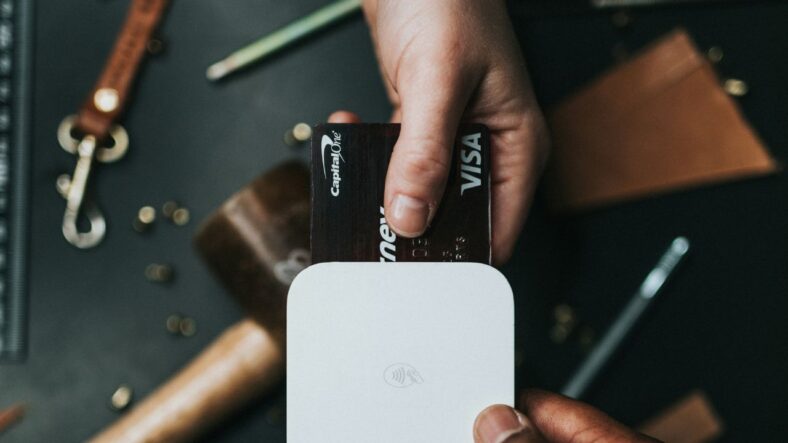
Financial goals are hard to plan out, and even harder to maintain. We all want to save a little more, or at least, spend a little less. But implementing those goals is easier said than done. So what are some healthy financial habits that you can try to get your wealth moving in the right direction?
Instead of putting it off, let’s start these ten healthy financial habits that will help you learn how to make better choices with your money.
Related: New Year, New Budget: How to Set Savings Goals That Last
10. Pay Yourself First

Known as the “pay-yourself first-budget strategy” puts your savings as a higher priority above living expenses. It might sound drastic to lessen the importance of living expenses, but it doesn’t require much effort or tracking.
To try this method, you’ll need to look at your monthly expenses to see what you spend in a typical month. From there, determine how much you’ll put away in savings while still paying your bills. Then, simply put that exact amount of money aside each time you get paid and let the rest of the bills automatically get taken out of your account.
This shouldn’t stretch your normal expenses and cut down on the amount of budgeting you have to do each month. Plus, you will spend less on extra stuff you don’t really need because there’s no room for it until you reach your goals.
9. Set Clear Financial Goals

Goals are important to have. But it’s even more important to learn how to set achievable, and meaningful, financial goals. One of the best healthy financial habits to learn is to always be working towards something with your money.
This keeps you motivated when putting money aside, and prevents you from splurging on things that aren’t necessary. Whether you want to pay off debt, move to a new apartment, or save for a vacation, having a meaningful yet achievable goal will prevent you from slipping.
Check Out: Charting a Course to Financial Success in the New Year
8. Limit Credit Card Usage

Credit cards are a great resource to have; They are convenient, easy to use, and many offer bonuses and rewards when using them. But with the convenience of credit cards, it’s easy to get carried away.
One of the most healthy financial habits is limiting your credit card use. If you end up overcharging your credit card, you can easily fall into debt. While everyone pays off their credit cards differently, the simple point is overspending will set you back and negatively impact your credit score.
7. Plan for Retirement

If you want to start practicing healthy financial habits, planning, or at least thinking about retirement is a huge step. Maybe that means putting money away or calculating how much to invest.
A common approach to estimate your retirement savings goal is about 70% to 90% of your pre-retirement income. Having this much saved annually will help you maintain your current lifestyle throughout retirement. But this can vary depending on your personal plans and goals
Read Next: Things You Should Know Before Getting a Credit Card
6. Automate Savings

For those that struggle to put away money should try to automate savings. This process automatically transfers money into savings, similar to making automatic bill payments. It simply allows you to set it and forget it.
Some programs, like Bank of America’s Keep the Change program, allow you to round up your purchases to the nearest dollar, with the spare change automatically transferring to your savings account. This is the perfect hack if you want to create easy and healthy financial habits.
5. Monitor Possible Fraud

One of the best healthy financial habits to start is monitoring your finances and credit score for possible fraud. This helps you ensure that your accounts are protected and all charges are accurate.
Whether you’re shopping online or in person, unforeseen events like data leaks, cyber-attacks, or even stolen information. Be sure to protect your financial future and keep an eye on all your expenses.
Also Read: The Importance of Regular Financial Reviews and How to Conduct Them
4. Invest Regularly

This might not be a worthwhile option for everyone, but investing is important to growing wealth.
When investing, whether it’s stocks or within your retirement plan, you can ultimately make more money than if you just put money away on your own. Investing can truly help you reach your goals faster. Be sure to learn and strategize on investments and stay within your comfort level.
3. Avoid Unnecessary Debt

This might be a no-brainer, but when working towards creating more healthy financial habits, you really should avoid unnecessary debt. This coincides with limiting your credit card usage as well. Avoiding debt will not only prevent and reduce financial strain but improve credit health as well.
To do this, you need to stay on top of paying your bills on time and keep anything from going into the negative. Avoid big purchases — or, if it’s a necessity, try to save enough money to pay in full instead of putting it on a credit card.
Check Out: Emergency Funds: Why You Need One Now More Than Ever
2. Build an Emergency Fund

One of the best healthy financial habits that everyone should work towards is building an emergency fund. This pool of money is just what it sounds like — having money on the side for emergencies. Whether you need to repair the car, experience a medical emergency, or get laid off at work, emergency funds can prevent you from going into debt.
It might even be worthwhile to have two savings accounts, one for overall savings and the other for emergencies. Wondering how much you need? It’s up to you and your goals, but the average goal is three months of living expenses.
1. Create a Budget

And of course, if you’re looking for some of the best healthy financial habits to get your money situated, the best thing you can do is start budgeting. Keep track of where your money goes, so you never feel stressed or out of control. Try creating a simple budget spreadsheet in Excel and build upon it over time.
This process can categorize all of your expenses, determine where you’re overspending, and figure out which areas you can cut back. This will give you peace of mind with your money because you are so tuned into every expense.
Read More: Teaching Kids About Money: How to Instill Good Financial Habits in Your Children Early On